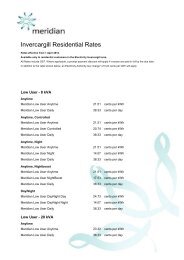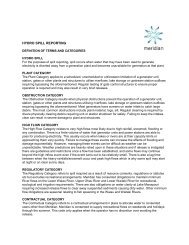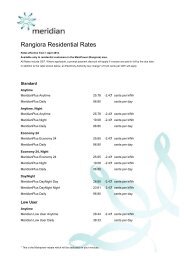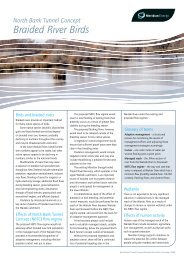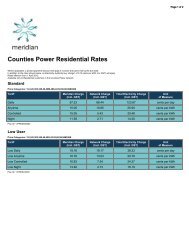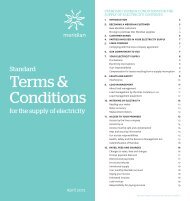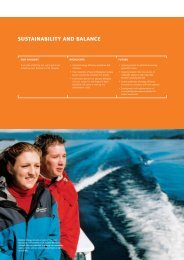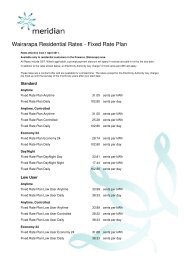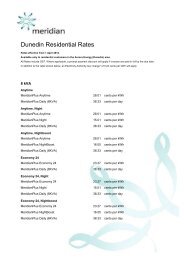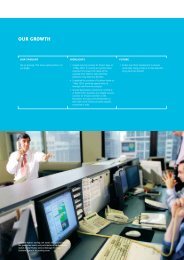Meridian Annual Report - Meridian Energy
Meridian Annual Report - Meridian Energy
Meridian Annual Report - Meridian Energy
You also want an ePaper? Increase the reach of your titles
YUMPU automatically turns print PDFs into web optimized ePapers that Google loves.
65<<br />
<strong>Meridian</strong> <strong>Energy</strong> Limited — Notes to the Financial Statements (continued)<br />
21. Deferred Tax Liability (continued)<br />
Certain deferred tax assets and liabilities have been offset in accordance with the Group’s accounting policy. The following is the analysis of the deferred<br />
tax balances (after offset) for balance sheet purposes:<br />
Group<br />
Parent<br />
2008<br />
$’000<br />
2007<br />
$’000<br />
2008<br />
$’000<br />
2007<br />
$’000<br />
Deferred Tax Liability 1,329,478 1,331,772 1,312,807 1,325,131<br />
Deferred Tax Asset (1,122) (37) - -<br />
1,328,356 1,331,735 1,312,807 1,325,131<br />
22. Financial Risk Management<br />
<strong>Meridian</strong>’s activities expose it to a variety of financial risks: market risk (including electricity and other price risk, currency risk, interest rate risk, cash<br />
flow risk) credit risk, and liquidity risk. <strong>Meridian</strong>’s overall risk management programme focuses on the unpredictability of financial markets and the<br />
electricity spot price and seeks to minimise potential adverse effects on the financial performance and economic value of the Group. <strong>Meridian</strong> uses<br />
derivative financial instruments such as foreign exchange contracts and options ‘FEC’, cross currency interest rate swaps ‘CCIRS’, interest rate swaps<br />
‘IRS’ including forward rate agreements and interest rate options, and electricity contracts for differences ‘CfD’s’ to hedge certain risk exposures.<br />
<strong>Meridian</strong> uses sensitivity analysis to measure the amount of risk it is exposed to for price risk, foreign exchange risk and interest rate risk and aging<br />
analysis for credit risk.<br />
Risk management for interest rate risk and currency risk is carried out by the Group Treasury department under policies approved by the Board.<br />
Electricity price risk management is carried out by a centralised electricity risk management group. These groups identify, evaluate and economically<br />
hedge financial risks in close co-operation with the Group’s operating units. Hedges are undertaken on an economic basis based on net exposures and<br />
cash flows. The Board provides written principles for overall risk management, as well as policies covering specific areas such as electricity price risk,<br />
interest rate risk, foreign exchange risk, and credit risk.<br />
a) Market Risk<br />
i) Foreign Exchange Risk<br />
<strong>Meridian</strong> borrows in foreign currencies and is exposed to foreign exchange risks, primarily in respect of the U.S. and Australian dollar. In addition,<br />
the Group incurs capital and operating expenditure denominated in foreign currencies which exposes the Group to foreign exchange risk primarily in<br />
respect of U.S. dollars, Japanese yen, Australian dollars and the Euro. <strong>Meridian</strong> does not enter into foreign exchange contracts for speculative purposes.<br />
In respect of overseas borrowings, the Group’s policy is to hedge 100% of the foreign currency exposure of both interest and principal repayments.<br />
This is achieved through CCIRS which swap all foreign currency denominated interest and principal repayments with New Zealand denominated<br />
payments over the life of the borrowings. The combination of the foreign denominated debt and the CCIRS result in a Group exposure to New Zealand<br />
floating interest rates and a fixed New Zealand denominated principal repayment. The New Zealand floating interest rate risk is managed as part of the<br />
New Zealand interest rate risk as described in the following section.<br />
<strong>Meridian</strong> establishes a combination of both cash flow and fair value hedges for the CCIRS and the foreign denominated borrowings (refer to<br />
Note 23 – Derivative Financial Instruments). The aggregate notional principal amounts of the outstanding CCIRS at 30 June 2008 was $704.649 million<br />
(30 June 2007: $704.649 million).<br />
In respect of foreign exchange exposures on capital and operating expenditures denominated in foreign currencies, <strong>Meridian</strong> hedges the foreign<br />
exchange risk through a combination of foreign exchange forward contracts and options “FEC”. Capital projects which are approved by the Board<br />
are hedged 100% whilst capital projects which are anticipated but not approved are hedged up to 50 % based on treasury limits. All committed<br />
foreign currency exposures of greater than $100,000NZD equivalent are hedged. The aggregate notional principal amounts of the outstanding FEC<br />
at 30 June 2008 was $269.757 million (30 June 2007: $579.247 million).<br />
In cases where the capital expenditure qualifies as a highly probable transaction, <strong>Meridian</strong> establishes a combination of both cash flow and fair value<br />
hedges. To the extent these hedges are effective, gains and losses on the derivatives are included as a component of the cost of the capital expenditure.<br />
In instances where the forecast capital expenditure does not meet the highly probable requirements, hedge accounting is not sought and the<br />
derivatives are classified as held for trading (refer to Note 23 – Derivative Financial Instruments).<br />
The value of foreign currency derivatives is sensitive to changes in the forward prices for currencies. The table below summarises the impact of a<br />
10% increase/decrease in the New Zealand dollar against the forward price of the U.S. dollar, Australian dollar, Japanese yen and Euro, as at<br />
30 June, on the Group’s profit and equity on the assumption that all other variables are held constant.



